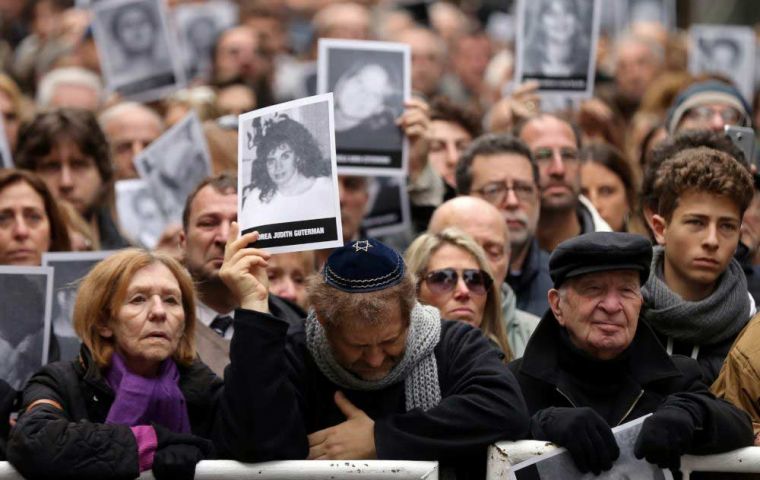MercoPress. South Atlantic News Agency
Argentina: Relatives of AMIA bombing victims to appeal court ruling dismissing charges against CFK
 A case can't be dismissed before the actual trial, the plaintiffs' lawyer said
A case can't be dismissed before the actual trial, the plaintiffs' lawyer said Relatives of the victims of the 1994 bombing of the Israeli Social Welfare Association of Argentina (AMIA) Friday announced they would appeal a court ruling issued Thursday in which charges against former President and current Vice President Cristina Fernández de Kirchner (CFK) were dismissed.
CFK had been accused of treason for signing a Memorandum of Understanding with the Islamic Republic of Iran to investigate the case in which several Iranian citizens were said to have been involved, as well as the 1992 bombing of Israel's Embassy in Buenos Aires.
The magistrates signing Thursday's ruling argued there could be no treason since Argentina was not at war with Iran and, besides that, the agreement had never actually be put in place.
In fact, the case -filed by the late Prosecutor Alberto Nisman- had been closed years before due to lack of evidence, but it had been reopened during former President Mauricio Macri's government (2015-2019) by judges whose allegiance to the head of state and non-existen impartiality had been established.
According to Nisman, CFK had also covered-up for the perpetrators of the atrocious crimes through the 2013 signing of the memorandum.
The plaintiffs' (relatives of the deceased and injured) counselor Tomás Farini Duggan said Friday his clients would appeal Thursday's ruling by the Federal Oral Court Number 8, which in addition to CFK benefitted other high-ranking government officials, many of whom have other positions within the current government, as well as delivering a post-mortem relief to the memory of then Foreign Minister, the late Héctor Timerman.
The AMIA bombing left 85 dead. Members of Iran's current administration as well as of the terrorist group Hezbollah are suspected to have been involved in the case.
The plaintiffs maintain the final goal of the memorandum was to waithdraw Interpol's “red alerts” for the international arrest of the suspects.
Farini Duggan said the relatives feel “mocked” by the court's unprecedented decision because it had occurred before the trial had even begun.
“A defendant is not dismissed when the oral trial stage is reached. There must be an oral trial and, after all the evidence is produced in the trial, he is acquitted or convicted. But a dismissal cannot be issued saying that there is no crime without a trial,” said the lawyer in a radio interview.




Top Comments
Disclaimer & comment rulesCommenting for this story is now closed.
If you have a Facebook account, become a fan and comment on our Facebook Page!